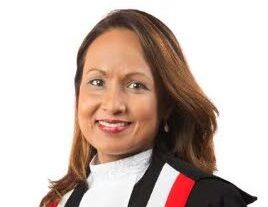Judge: SEA exam scripts joint property of CXC and students

A HIGH COURT judge has ruled that the failure by the Ministry of Education to provide the exam scripts to the parents of a student who sat the Secondary Entrance Assessment (SEA) examination in 2018 was unreasonable, irrational and amounted to a breach of the provisions of the Freedom of Information Act (FOIA).
The judge also had some harsh words for the ministry's conduct.
“The conduct of the defendant in the instant action must be condemned in the strongest language and steps must be taken forthwith by the defendant to treat any application under the FOIA with the degree of urgency which the public of Trinidad and Tobago deserves,” Justice Margaret Mohammed held.
Despite passing for his first choice, the parents of the student who attended the Curepe Presbyterian School filed a freedom of information request seeking to find out what was the child’s English Language Arts Writing (ELAW) script for the 2018 examination and the individual scores assigned to him for each dimension of the creative writing rubric, which included the writing process, content, language use, grammar and mechanics and organisation.
The child received 70 percent in the ELAW component of the exam but his parents formed the view that there was an error in the assignment of the grade or a miscoding of his grade. In order to find out what went wrong with their son’s score for the ELAW component, they filed a request for review.
In her decision, Mohammed said the process was not smooth. Reviews that were distributed to parents were recalled because of some “mistake” and when the process resumed, the parents of the child received his with the response that his score remained the same.
The judgment said the boy’s parents were concerned about the discontinued review process and of reports of several “coding errors” in the 2018 review process.
Because of this, they filed the freedom of information request seeking answers.
In response, the ministry, in January 2019, said the child’s review was not modified since the Caribbean Examination Council (CXC) indicated there was no change in his ELAW score and, on the request for each component of the marking scheme, those documents were the property of CXC which was not a public authority within the meaning of the FOIA.
Not satisfied with the response, the student’s parents filed a judicial review claim seeking an order compelling the ministry to provide them with the information they asked for.
In her decision, Mohammed said although CXC owns the copyright of the examination paper, it did not own the right of the exam script submitted by each student who has taken the exam.
“It seems to me that each script is the body of work of the individual student, which is unique. In order for CXC alone to own the copyright of the exam scripts after they have been completed by the students, the parents or guardians of the students must provide written approval before the said exam, giving up any rights of ownership of the students’ work to CXC. However, there was no such evidence in this action.”
She said it was “remarkable” that the ministry did not implement any system for parents or guardians of students to expressly give up any rights of ownership over their exam scripts.
Mohammed added, in the absence of this evidence, the marked exam script was jointly owned by CXC and the respective student and this was not a basis for the ministry failing to provide it.
She also said the secrecy and security clause of the SEA agreement between the ministry and CXC was not any proper basis for refusing to provide the student’s parents with the information.
The agreement provides for the ministry and CXC to agree to not, without prior consent in writing, disclose any information on the examination to anyone not authorised to receive the information. It also provides for both parties to take precaution so that unauthorised people do not have access to components of the paper, or records or any tests or scripts.
She said as parents of the student, they were authorised to view his exam script.
“In my opinion, given all the critical functions which the MOE performs in the SEA exam, it would be absurd to construe the SEA agreement as if the marked SEA exam scripts are not within the “power” of the MoE.
“Indeed the failure to include any expressed provision in the SEA agreement preventing CXC from providing the marked script to the MoE upon the latter’s request, supports the position that it was never intended that CXC had the power to refuse such a request from the MoE.”
The judge was unable to grant the order for the student’s scripts to be given to his parents since they would have been disposed of by CXC which retains the physical scripts of candidates for only six months.
She has also ordered that the ministry pay the student’s parents’ costs.
The parents were represented by attorney Rudyard Davidson while Niquelle Nelson Granville and Laura Persad appeared for the ministry.


Comments
"Judge: SEA exam scripts joint property of CXC and students"